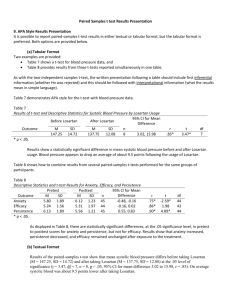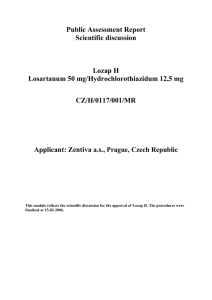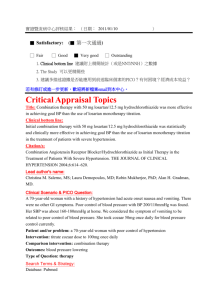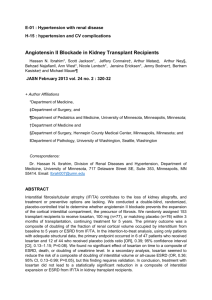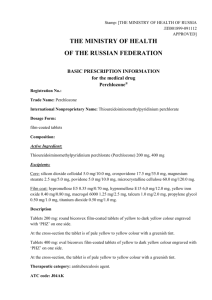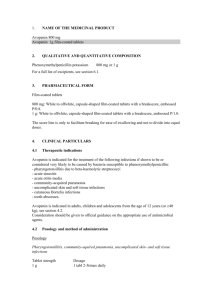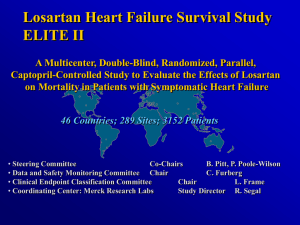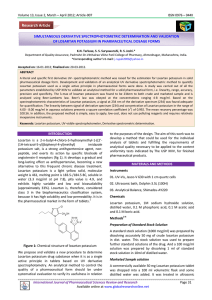Public Assessment Report
advertisement
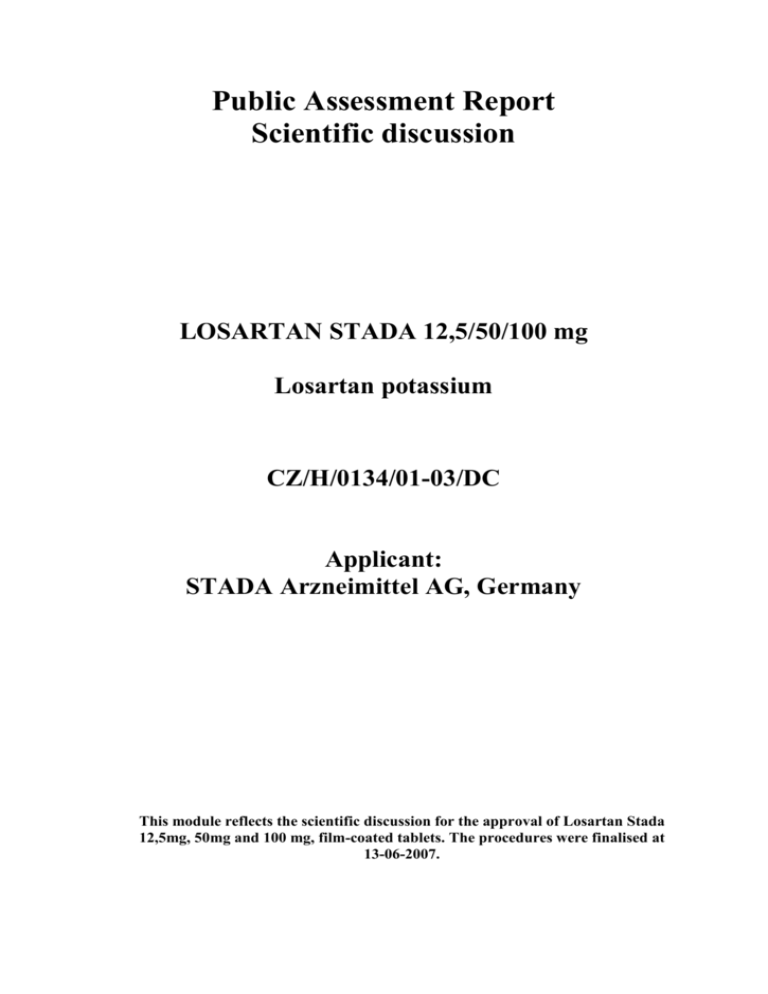
Public Assessment Report Scientific discussion LOSARTAN STADA 12,5/50/100 mg Losartan potassium CZ/H/0134/01-03/DC Applicant: STADA Arzneimittel AG, Germany This module reflects the scientific discussion for the approval of Losartan Stada 12,5mg, 50mg and 100 mg, film-coated tablets. The procedures were finalised at 13-06-2007. INTRODUCTION This application concerns a generic version of losartan potassium, which is produced and submitted for authorisation under the trade name Losartan Stada 12,5/50/100mg, film-coated tablets. In this Overview, the names Losartan Stada 12,5/50/100mg, film-coated tablets are used. The originator product is Cozaar tablets, produced and marketed by MSD, authorized in the Czech Republic since 1999. Losartan is specific angiotensin II type (AT1) receptor antagonist. It is indicated for the treatment of hypertension, heart failure, for the treatment of hypertensive patients with left ventricular hypertrophy and for renal protection in type 2 diabetic patients with proteinuria. The recommended daily dosage is 50 or 100 mg once daily. For the heart failure, initial dose is 12,5 mg once daily, with titration to levels between 50 mg once daily as tolerated. QUALITY ASPECTS Introduction Losartan Stada 12.5/50/100 mg is presented in the form of film-coated tablets containing 12.5, 50 or 100 mg of the active substance losartan potassium. The excipients are lactosum monohydricum, starch pregelatinized, microcrystalline cellulose, silica colloidal anhydrous, magnesium stearate and Opadry 03B28796 White as film coating agent containing hypromellose, titanium dioxide and macrogol 400 and carnauba wax as polishing agent. The film-coated tablets are packed in white opaque PVDC-coated PVC blisters, sealed with aluminium foil. Blisters are placed, together with a package leaflet, into a paper folding box. Active Substance Two sources are proposed for the active substance. Both manufacturers provided DMF and Letters of Access. The manufacture has been described in detail. Losartan potassium is a white to almost white crystalline powder. It is soluble in water, methanol and ethanol, practically insoluble in chloroform. It shows polymorphism and optical isomerism. There is no Ph.Eur. monograph for the losartan potassium but a USP monograph exists. The in-house specifications proposed by both manufacturers are satisfactory for control of quality, methods are satisfactorily validated. Certificates of analysis have been provided; results comply with the proposed specifications and confirm the consistency of the process. The common specification for both sources has been proposed by the finished product manufacturer. The substance is packed in a LDPE bag closed with a plastic fastener. The secondary bag is an aluminium bag, heat-sealed and placed in a fibre drum or triple laminated bag inserted into a HDPE container. Inner plastic bags meet the requirements of EU Directive 2002/72/EC. Appropriate stability studies according to ICH guidelines have been carried out. The product was subjected to forced degradation. The polymorphic form has been controlled. Based on the stability results, the proposed re-test periods for both sources when stored in the proposed packaging are acceptable. Medicinal Product Losartan Stada 12.5/50/100 exists as film-coated tablets. The qualitative and quantitative composition of all strengths is detailed for the core and the film-coating. All excipients are common pharmaceutical grade products covered by Ph.Eur. monographs except Opadry White which is controlled using an in-house specification. Satisfactory Certificates of Analysis of all excipients have been provided. The only excipient of animal origin is lactose. It is milk derivate which is sourced from healthy animals under the same conditions as milk collected for human consumption, therefore the TSE risk is negligible. Pharmaceutical Development The development of the medicinal product has been sufficiently described. To demonstrate the equivalence to the innovator product, the comparative dissolution profiles and the comparative impurity profiles have been provided and were found to be the same for the innovator and generic product. Based on these results, the generic product Losartan Stada can be considered as essentially similar to the brand leader product Lorzaar Protect Tablets, MSD. Manufacturing of the product The manufacturing process can be considered as standard. The manufacture and in-process controls are fully described in the dossier. All physical and chemical properties which are critical for quality of the product were monitored. Results of process validation on pilot scale batches have been submitted. It may be concluded that the manufacturing process has been shown to be reliable and capable of consistently producing a product that complies with preestablished quality and specifications. Product specification Satisfactory control tests are applied at the time of release and during shelf-life. Release and shelf life limits for the assay of losartan potassium are in line with batch and stability data. Limits for related substances are in line with ICH guidelines and stability data. Analytical methods have been satisfactorily described and validated in accordance with regulatory requirements. Satisfactory batch analysis data have been provided for three batches of each strength. The batch results comply with the specification and demonstrate consistent manufacture. Stability of the product Stability trials were performed on the drug product according to the stability protocols and ICH guidelines. Based on the data shelf-life of 2 years when stored in the original container to be protected from light is acceptable. The applicant commits that the stability study will continue post approval for up to 3 years. Discussion on chemical and pharmaceutical aspects Information on development, manufacture and control of the drug substance and drug product has been presented in a satisfactory manner. The results of tests carried out indicate satisfactory consistency and uniformity of important product quality characteristics, and these in turn lead to the conclusion that the product should have a satisfactory and uniform performance in the clinic. CLINICAL ASPECTS - Based on the review of the data on quality, safety and efficacy, the Reference Member State considered that the applications for Losartan Stada film-coated tablets (12,5/50/100 mg) can be approved. The applicant updated the SPC a PL wording according to comments from CZ, EI, and FI and previously finished procedure DK/H/914/001-003/DC. The legal basis of this application is Article 10(1) generic application and Article 10(3) hybrid application of Directive 2001/83/EC, as amended. The product concerned claims essential similarity to the reference product Cozaar film-coated tablets. The Package leaflet has been shown to provide the tested consumer with all required information in a clear and comprehensive form and the Readability testing was performed according to the guidelines. To support the application the applicant has submitted one bioequivalence study with 100 mg products. A single centre, two treatment, randomized, open label, single-dose, 2-way crossover, fasted study in healthy subjects has been conducted. The study evaluated the comparative bioavailability of test formulation containing 100mg of losartan with Lorzaar Protect 100mg. Forty healthy subjects (8 females and 32 males), were enrolled into the study when fulfilling inclusion criteria, mainly physical examination, medical history, biochemistry, and haematology screens as specified in the protocol. Mean age of the subjects was 39 ± 10 years; mean weight 75.7 ± 11.8kg; and mean BMI 25.2 ± 2.7 kg/m2. Thirty-nine subjects completed the study and were included in the PK evaluation. One volunteer elected to withdraw from the study prior to drug administration in Period 2 due to personal reasons. Blood samples were collected prior to study drug administration and 0.250, 0.500, 0.750, 1.00, 1.25, 1,50, 1.75, 2.00, 2.50, 3.00, 3.50, 4.00, 4.50, 5.00, 6.00, 8.00, 10.0, 12.0, 16.0, 24.0, and 30.0 h post-dose in each period. The treatment phases were separated by a washout period of 7 days. The results show low intra-individual variation after administration of the compared products. ANOVA performed on the PK parameters did not detect any significant difference between the test and reference products for any of the parameters AUCt, AUCinf., Cmax. Further, there were no statistically significant differences between analysed factors of treatments, periods, and sequences in case of the losartan and E7143 pharmacokinetic parameters of AUCt, AUCinf., and Cmax. The results lie in the standard range for concluding BE. Mean values for losartan and E3174 percentage of extrapolated area under the curve were 1.39% and 1.69% for the test product, or 1.36% and 1.78% for the reference treatment, respectively. There were only minor deviations from protocol mainly delayed centrifugation of few collected blood samples. One blood sample has not been analyzed due to prolonged handling time out of documented and validated stability range. Averse events have been monitored while of the total 40 post-dose adverse events reported, the relationship of 8 adverse events was judged as "probable", 15 as "possible", 13 as "remote", and 4 as "unrelated". Both formulations were well tolerated, with no major side effects and no relevant differences in safety profiles were observed between the preparations, particularly with respect to the number and pattern of adverse events. Bioequivalence has been satisfactorily demonstrated.
